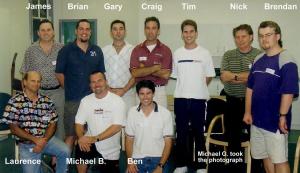Workplace issues for men
The group individually introduced themselves and their reasons for attending. Once again, the issue of Child Protection for male workers was raised. The experienced workers in the group were able to provide some advice and strategies for males to use when in the workplace.
Situations were bought up by the experienced workers and their strategies for dealing with them. Some guys said that it was difficult sometimes when you are new to the centre, or working as a casual or a student, when it occurs sometimes that you are placed in risk situations (e.g. being left alone in the room for a minute or two, or having to change a nappy out of sight of other staff).
There was discussion on how to bring up these issues with the regular staff rather than ignoring them. It was stressed that male workers have to at all times ensure their safety. A comment was made that perhaps female workers don’t have these issues confronting them so much because no one will point the finger at them if something goes wrong. This is a reality that male workers face daily.
The group discussed some ideas of how to ‘fit in’ (as a male) with a female staff team (or as a student). It was agreed that most female staff think that having men is a good idea and are positive. There are sometimes problems when the female staff actually have to deal with a male colleague on a day to day basis. One guy said, “Women want us in, definitely, but when we’re there they aren’t sure about us.”
It was thought that perhaps some females find this confronting because they do have ‘ownership’ in a sense of the early childhood field, and men need to respect this.
One of the initiatives that the Network Group can work on is giving a ‘male voice’ to children’s services. We agreed that all children need to see men being themselves in child care, and that there are many strengths that men bring to the field. The consensus was that the positives outweigh the negatives.
Comments were made such as, “The kids always say, ‘I want that man to come back,’ or they ask me ‘When are you coming back?’ if I do a day with them.” Also, the experience of being a male working with young children was described by one guy as “You become like an uncle, it’s an extended family.”
An issue that was discussed concerned pay rates for children’s services workers. If you are a male and possibly the family breadwinner, then the low salaries are something to consider. Some male workers go into other industries because of this.
Some in the group suggested that it is worth doing your Degree to earn the extra dollars. The experienced workers gave advice and information to the others about how to gain casual or further employment in the field. One of the purposes of the group is to provide networking for male workers, so it was great to see this happening.
There was some talk about how some men join the field. An interesting point was that many men come into it ‘accidentally’ after having their own children and caring for them. These men are unhappy in traditional jobs, so they react to the enjoyment they have caring for their own kids and move into working in children’s services.
A photo was taken of the group, someone suggested for it to be used as a world or at least Australian record of the highest number of male early childhood workers ever in one room.
It was decided that the Network Group will hold a meeting in the near future in a more ‘social’ setting.

